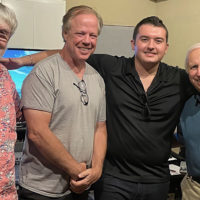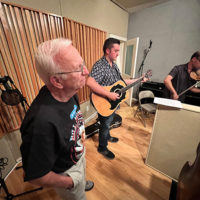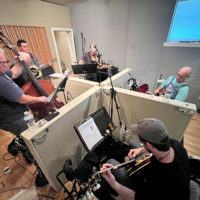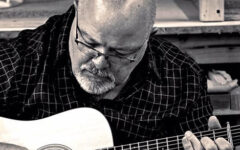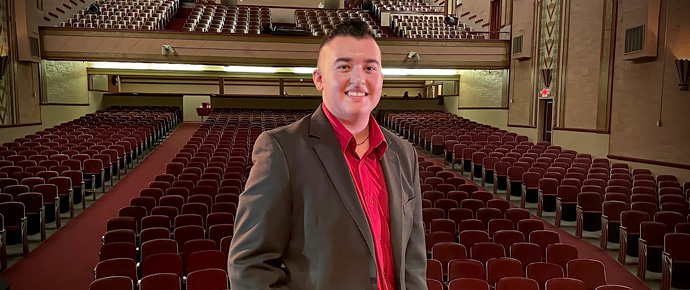
Bluegrass singer Brayden Williamson has long appreciated the legacy that Bill Monroe left, and has done much to build on that in his short musical career. Others are now recognizing his desire to keep traditional bluegrass alive, and encouraging the growth of the music.
One person who recognizes these traits is Vic Gabany, Bill Monroe’s recording engineer for 21 years – 1971 – 1992 and his last producer – so it isn’t any surprise that Gabany has taken Williamson under his wings.
In their latest joint venture Williamson and Gabany have gotten together with Dave Kirkey (the owner of Eagle Canyon Music, Lebanon, TN) and recording engineer Kurt Storey, to provide further impetus to Williamson’s career.
Brayden confides ….
“It was Vic Gabany’s idea to initiate the session. He chose me to be the torch bearer of the un-recorded Bill Monroe song that he and Bill owned together.”
Williamson elaborates ….
Lonesome Moonlight Waltz, is an instrumental that Bill Monroe that wrote on the mandolin in the 1950s. It has since been adapted into a lonesome and beautiful violin instrumental.
Hank Williams once told Monroe, ‘Lonesome Moonlight Waltz was the most beautiful sounding instrumental he’d ever heard.’ Hank then suggested to Bill that he should write words to the song due to the very easy listening melody. Bill Monroe then called upon Vic Gabany (in the 1980s) to help him write some lyrics to this masterpiece. Vic then went to work, writing what he felt best described the story that Bill Monroe had given Vic behind the melody. It’s about an old man from Kentucky that had lost his wife, and he eventually travels to go be with her once again so they can dance to their Lonesome Moonlight Waltz.
It was never released or recorded before Mr. Monroe passed away in 1996.”
During four days last month – June 26 to June 29, 2022 – the quartet got together to do tracking at the Eagle Canyon Studio and PoodleVilla studios for this and three other songs; Watching the Grass Grow – a song that Williamson wrote three years ago; I Just Go to the Cross, another penned by Williamson; and a much more recent composition, A Man Named Bill Monroe which Williamson recently introduced to the Bean Blossom audience …
The producers of this 2022 session brought in the legendary Mike Compton to play mandolin. “Mike is the best man for this job due to his close connection to Bill Monroe, and his efforts to preserve the mandolin style of Monroe with a modern touch,” Williamson noted.
Adding ….
“Mike Bub came in carrying his upright bass ready to roll and keep the songs in the right direction. His steady direction and choice of transition notes made this session so fun and easy to play to. He couldn’t have played a better timing and selection of notes in each song.
Chad Cobb was chosen to play all of the fiddle parts in each song of the session, Chad is among the best soulful and tasteful violinists in the business today. His kick-off to Lonesome Moonlight Waltz and his soulful breaks in the songs I wrote make the listener want to continue listening for more.
For banjo, Cory Walker was the man for the job. His modern twist on a traditional Scruggs/J.D. Crowe banjo style compliments each song. Two songs in the session begin with a banjo kick-off and Cory’s choice of tasteful notes and rolls make the songs sound like what bluegrass should be.
Jimmy Stewart added dobro on the session; Jimmy is known now as the Josh Graves of the 21st century. He has developed a great style of dobro playing to remind you of how a dobro should sound in bluegrass music.
Johnny and Mary Meyer added in the background vocals to I Just Go to the Cross and Lonesome Moonlight Waltz.”
Williamson is full of praise for their contributions …
“The harmony in the chorus of I Just Go to the Cross will truly take you to church. The haunting vocal impressions in Lonesome Moonlight Waltz will perfectly match up the storyline Bill Monroe had in mind many years ago, giving the effect to new listeners that this song was written for words.
Hopefully, this EP will be available for you to hear soon.
We can’t wait to release this material out to the public and share the top-quality cuts with our radio friends and promoters.”
Williamson concludes …
“I indeed realize this is something that doesn’t get offered to many up-and-coming 19-year-old musicians. I am so thankful for the opportunity to carry on this legacy and take care of it.
Thank you, Vic, Kurt and Dave; as well as the talented musicians and vocalists that worked on this project with me.”

